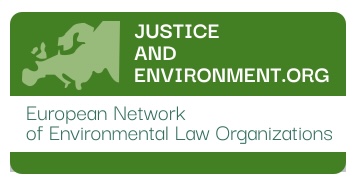A new initiative will promote climate justice across Europe

Climate advocates celebrate in December 2019 after the Supreme Court of the Netherlands upheld a ruling that the Dutch government is obligated under international human rights law to more ambitiously reduce greenhouse gas emissions that drive global warming. (photo courtesy of Urgenda)
Does governments’ unwillingness to reduce carbon emissions impair the rights of EU citizens? While the answer is already on the 2023 agenda of the European Court of Human Rights (ECtHR), a collaborative initiative to boost the knowledge and implementation of climate rights is taking off. The pan-European Justice and Environment (J&E) network is pursuing “Discussions and Actions on Climate and Environment” – a project which spans across Austria, Bulgaria, Estonia, Hungary, Slovenia, and Spain. Its purpose is to raise people’s awareness of climate rights and boost their access to justice and participation in government decision-making that affects them.
J&E is aiming to lay ground for climate rights litigation and eventually connect citizens to lawyers who can protect their rights, said dr. Csaba Kiss. Himself an environmental lawyer based in Budapest, Kiss is the coordinator of the network, which connects 14 green law оrganisations across Europe.
J&E members often serve as environmental law focal points in their countries, handling cases, participating in legislative processes and providing legal analyses and consultations for national governments and civil society groups alike. This makes it possible for them to bring more climate cases to different national fora and/or courts and to the European Commission, Kiss explained.
Litigation against member states for not doing enough to protect their citizens from the impacts of climate change is on the rise in the EU and globally. According to the database of the US-based Sabin Center for Climate Change Law, there are currently nearly 3, 000 climate law cases globally, in 56 counties. The cases are both against governments and against corporations and individuals. Almost 2, 000 of those cases are in the US alone.
This follows upon a ground-breaking finding of the Intergovernmental Panel on Climate Change (IPCC). In its 2021 report, The Physical Science Basis, the world’s most authoritative source of climate science stated that “climate change is affecting every inhabited region across the globe and increasingly affecting people’s basic rights”.
Climate in the courtrooms
A tide of climate lawsuits reflect on IPCC’s findings. In one of the most high-profile cases, Germany’s top court ruled in 2021 that the government had to adjust its climate targets to avoid unduly burdening the young generations, AP informed. In response, the German government brought forward its target for ‘net zero’ emissions by five years to 2045 and set more ambitious steps towards that goal.
Already in 2019, the Supreme Court of the Netherlands upheld the rulings of the lower courts that the government is not doing enough to limit greenhouse gases (GHGs) and ordered the Dutch State to limit GHG emissions to 25% below 1990 levels by 2020. The court also found the State is acting against human rights as defined under Article 2 of the ECHR, which protects the right to life, as well as under Article 8 of the ECHR, which protects the right to private life, family life, home, and correspondence.
Fridays For Future – Estonia filed a case against Eesti Energia challenging the construction of a new shale oil plant in Estonia. The plaintiffs argue that local authorities issued a permit to construct the new plant without adequately assessing its climate impacts, Estonia’s commitments under the Paris Agreement, and the EU climate mitigation targets.
The Czech Republic joined the Netherlands, France, Germany, and other EU countries in determining a government’s duty to mitigate climate change. In June 2022, the Prague Municipal Court ruled in Klimatická žaloba ČR v. Czech Republic that the Czech Republic’s failure to take sufficient GHG mitigation measures is unlawful and that the state should abstain from continuing to infringe the plaintiffs’ human rights by such failure. The Ministry of the Environment appealed on points of law to the Supreme Administrative Court.
In November 2022, prodigy activist Greta Thunberg and 600 other young people sued Sweden for failing in climate change mitigation, and the case was accepted by the Swedish court on March 21, 2023. This year the European Court of Human Rights (ECtHR) is expected to rule on cases against Portugal, Sweden and France where plaintiffs claim their human rights are violated by their governments’ unwillingness to reduce carbon emissions.
In June 2023, Montana will see its first children’s climate trial in US history.
Empowering citizens
J&E’s initiative takes off from establishing what climate rights are and what legal frameworks allow for their enforcement through litigation and other procedural means. Project partners aim to understand what could be improved locally to support people who seek climate justice. People need to know what their specific climate rights are and what can legally be required from national governments in that regard, explained Plamen Peev, PhD, a senior environmental policy expert at Bulgarian partner BlueLink.net.
A 2021 EU-wide Eurobarometer survey reports that most EU citizens consider climate change the single most serious problem facing the world and are willing to take action on it. 75% of them do not believe their national governments are doing enough to tackle it. To gauge national perceptions on the gravity of climate change and citizens’ willingness to exercise their rights, the 6 project partners are conducting social surveys and opinion polls.
Findings and action recommendations identified will be communicated to local stakeholders and the public at national events. The partners will seek to inform environmental and human rights groups and affected local communities about what their government is doing to address climate change and what their specific climate rights are.
The project’s findings will also be presented to lawyers, members of national and EU parliaments and the European Commission, said Peev. Based on them, the project partners will prepare a joint proposal on improving climate policies, which can eventually influence climate legislation.
The initiative Discussions and Actions on Climate and Environment is funded by the European Union and coordinated by J&E in partnership with the International Institute for Law and the Environment (IIDMA, Spain), BlueLink Foundation (Bulgaria), The Alliance of the Austrian Environmental Movement (ÖKOBÜRO, Austria), the Environmental Management and Law Association (EMLA, Hungary), the Legal Center for Human Rights Protection (PIC, Slovenia), and the Estonian Environmental Law Centre (EELC, Estonia). All views and opinions expressed are the authors’ only and do not necessarily reflect those of the European Union (EU) or of the granting authority – the European Education and Culture Executive Agency (EACEA). Neither the EU nor EACEA can be held responsible for them.Contact information: Csaba Kiss, Coordinator, Association Justice and Environment, z.s., European Network of Environmental Law Organizations, Udolni 33, Brno, 602 00, Czechia. Telephone: +36 1 3228462. E-mail: info@justiceandenvironment.org. Web: www.justiceandenvironment.org. On Facebook @justiceandenvironment. On Twitter: @JustEnviNet



